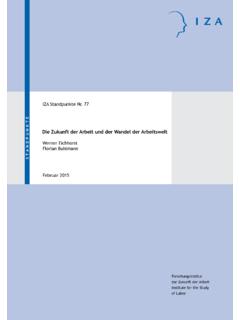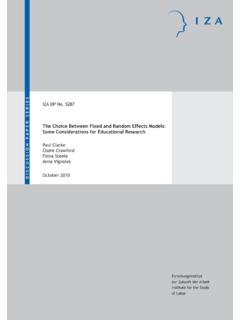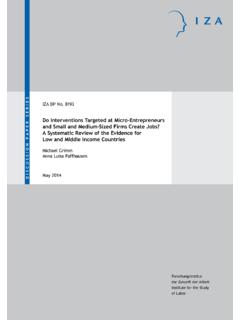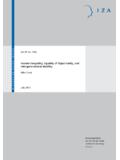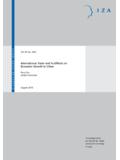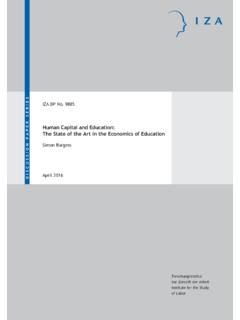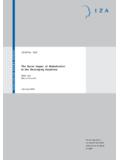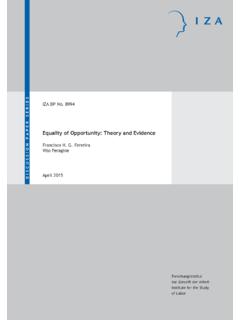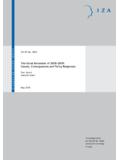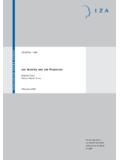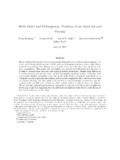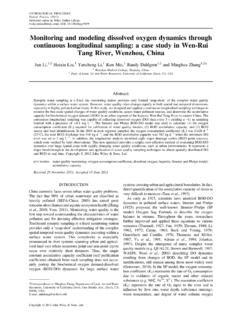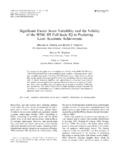Transcription of How Does Marriage Affect Physical and …
1 DISCUSSION PAPER SERIES. IZA DP No. 1619. How Does Marriage Affect Physical and psychological health ? A Survey of the longitudinal Evidence Chris M. Wilson Andrew J. Oswald May 2005. Forschungsinstitut zur Zukunft der Arbeit Institute for the Study of Labor How Does Marriage Affect Physical and psychological health ? A Survey of the longitudinal Evidence Chris M. Wilson University of East Anglia Andrew J. Oswald University of Warwick, Harvard University and IZA Bonn Discussion Paper No. 1619. May 2005. IZA. Box 7240. 53072 Bonn Germany Phone: +49-228-3894-0. Fax: +49-228-3894-180. Email: Any opinions expressed here are those of the author(s) and not those of the institute. Research disseminated by IZA may include views on policy, but the institute itself takes no institutional policy positions. The Institute for the Study of Labor (IZA) in Bonn is a local and virtual international research center and a place of communication between science, politics and business.
2 IZA is an independent nonprofit company supported by Deutsche Post World Net. The center is associated with the University of Bonn and offers a stimulating research environment through its research networks, research support, and visitors and doctoral programs. IZA engages in (i) original and internationally competitive research in all fields of labor economics, (ii) development of policy concepts, and (iii) dissemination of research results and concepts to the interested public. IZA Discussion Papers often represent preliminary work and are circulated to encourage discussion. Citation of such a paper should account for its provisional character. A revised version may be available directly from the author. IZA Discussion Paper No. 1619. May 2005. ABSTRACT. How Does Marriage Affect Physical and psychological health ? A Survey of the longitudinal Evidence.
3 This paper examines an accumulating modern literature on the health benefits of relationships like Marriage . Although much remains to be understood about the physiological channels, we draw the judgment, after looking across many journals and disciplines, that there is persuasive longitudinal evidence for such effects. The size of the health gain from Marriage is remarkable. It may be as large as the benefit from giving up smoking. JEL Classification: I0, I12. Keywords: mortality, health , Marriage , happiness, longitudinal Corresponding author: Andrew J. Oswald University of Warwick Coventry, CV4 7AL. United Kingdom Email: . Work on this paper was done while the second author was a Wertheim Fellow at Harvard University. Introduction Economists know that human beings reap financial benefits from Marriage . Even after controlling for other factors, married individuals earn much more than single people ( Chun and Lee (2001), Daniel (1995), Loh (1996), Reed and Harford (1989)).
4 There are gains, too, from economies of scale within the family (Becker 1981). Yet economists are less aware of an emerging body of research that finds wider benefits from Marriage -- one that suggests the mind and the body are intertwined in ways not fully understood. Sociologists, psychologists and epidemiologists have recently documented evidence of married people's better Physical health , longevity, psychological health , and reported happiness. Married individuals fare better in these terms than the never married, who in turn do better than the divorced, separated and widowed. Often the coefficients in such research imply strikingly large consequences from relationships. For example, using pooled cross-sections for the US and the UK, Blanchflower and Oswald (2004a) estimate the size of the Marriage effect upon mental well-being to be equal to that from an extra $100,000 dollars a year.
5 Formal Marriage itself seems to matter. In the few studies that compare married and non-married cohabiters, the results typically show an extra beneficial effect from being married. A common conclusion also asserts that these benefits are larger for men than for women; pioneering work here was done by Gove et al (1983). Finally, some argue that the benefits to happiness may be declining over time, relative to the non- married (Lee et al 1991, Glenn and Weaver 1988). This paper tries to assess these ideas. It is not a comprehensive survey -- the literature is already too large for that -- but it attempts, by looking across diverse literatures, to draw general messages that seem of interest to economists and other social scientists. Past reviews include Ross et al (1990), Burman and Margolin (1992) and Kiecolt-Glaser (2001) on physiological evidence, Coombs (1991) on wellbeing, and Waite (1995) on evidence of health , financial and other benefits.
6 Waite and Lehrer (2003) compare the benefits from Marriage with the benefits associated with being religious. In contrast to previous reviews, we concentrate on longitudinal evidence. The reason is that to economists (and many other kinds of investigators) this type of evidence is more persuasive than that from cross- sections. In cross-sectional patterns, causality is difficult to unearth. Although panel data do not always provide a solution, the ability to look at events through time is an advantage. First, panel data offer before-and-after evidence. Second, panel data make it possible to difference out -- in the econometric sense -- the underlying characteristics of the individuals being studied. We start in section I by looking at the possible mechanisms at work behind a correlation between health (mental or Physical ) and Marriage .
7 The section discusses methodological problems in this area, and how researchers have tried to resolve them. Section II reviews the effects of Marriage on mental health . In these research studies, the benefits of Marriage are commonly measured by studying the effect of matrimony on depression and alcohol abuse. Section III examines mortality. It shows that, after controlling for other factors, married people are far less likely to die in any given period than the non- married. Section IV reviews the correlations between Marriage and Physical health . Finally, section V. discusses tests of the channels from Marriage to wellbeing. Section I: Methodological Issues How are well-being and marital status interconnected? First, Marriage may itself lead to improved Physical and mental health . This has been called the protective effect of Marriage .
8 Alternatively, simple correlations could be interpreted as telling us merely that certain types of people can persuade a partner to marry them. This is the so-called selection effect. According to evolutionary principles, it would be no surprise if physically and mentally healthier individuals are more attractive to mates, and thus more likely to show up in data sets as married (and to stay married). Hence better health could be a cause of Marriage . If panels are not sufficiently long -- stretching back before the date of Marriage -- it may be impossible to correct fully for selection. In this research area, Lillard and Panis (1996) and Brockmann and Klein (2004) contain valuable discussions of how to control for selection. Cohen (2004) considers the possible channels from Marriage to health ; Ren (1997) argues that marital quality and marital history should be held constant in testing; the intriguing idea of using twins data is explored in Kohler et al (2004).
9 Selection effects need not work in a simple way. Joung et al (1998) explain with reference to Collins and Coltrane (1992) that, if assortative mating occurs, unhealthy people with unhealthy partners are more likely to be widowed. This could lead to a spurious relationship suggesting that widowhood causes ill health . Alternatively, Lillard and Panis (1996) suggest that if Marriage does give beneficial effects, then physically and mentally unhealthy individuals will face the greatest incentive to marry, giving an adverse' selection effect. As we shall see, the existence of adverse selection effects rather than the standard selection effect is supported by the evidence, but only for males. The mechanisms leading to possible benefits from Marriage have been explored. In section V, we look more closely at the research 2. evidence.
10 Here we review some suggested theoretical explanations. Further discussion is available in Ross et al (1990) and Wyke and Ford (1992). On the grounds that two can live almost as cheaply as one, Marriage may work simply because it provides higher real income per partner. Poorer standards of living are correlated with mental health problems (Ross et al 1990). Ross (1995) also shows that the married have the lowest incidence of economic hardship, while Smock et al (1999), who study switchers', find clear financial benefits for married women. Second, Marriage is a source of emotional and instrumental support. Emotional help seems to reduce the incidence of depression and mental illness (Ross et al 1990), and may provide an important buffer against stress (Kessler and Essex 1982, Berkman 1988). Marriage can also enhance feelings of attachment and belonging, which are thought to Affect mental health (House et al 1988), while releasing people from any possible social stigma associated with being unmarried.
